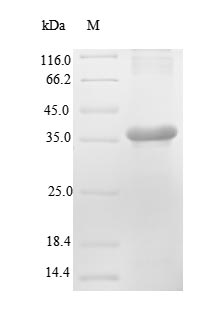Mouse Renin-2 Recombinant Protein Product Attributes
Product Type: Recombinant Protein
Recombinant Renin-2 based upon sequence from: Mouse
Host: QP8886 protein expressed in E. coli.
Tag: His
Protein Construction: A DNA sequence encoding the Mus musculus (Mouse) Renin-2, was expressed in the hosts and tags indicated. Please select your host/tag option, above.
Application Notes: Please contact us for application specific information for QP8886.
Bioactivity Data: Untested
Full Length? Partial (see sequence information for more details).
Expression Region: Ser64 – Asn351
Amino Acid Sequence: SSLTDLISPV VLTNYLNSQY YGEIGIGTPP QTFKVIFDTG SANLWVPSTK CSRLYLACGI HSLYESSDSS SYMENGDDFT IHYGSGRVKG FLSQDSVTVG GITVTQTFGE VTELPLIPFM LAQFDGVLGM GFPAQAVGGV TPVFDHILSQ GVLKEKVFSV YYNRGPHLLG GEVVLGGSDP EHYQGDFHYV SLSKTDSWQI TMKGVSVGSS TLLCEEGCEV VVDTGSSFIS APTSSLKLIM QALGAKEKRL HEYVVSCSQV PTLPDISFNL GGRAYTLSST DYVLQYPN
Purity: Greater than 90% as determined by SDS-PAGE.
Reconstitution Instructions:
Concentration of Mouse Renin-2 Protein:
Endotoxin Levels: Not determined.
Buffer: Tris-based buffer, 50% glycerol
Storage Conditions: Store at -20C to -80C.
| Recombinant Mouse Renin-2 Protein General Information | |
|---|---|
| Alternate Names | |
| Rnr; Ren; Ren-2; Ren-B; Rn-2 | |
| Curated Database and Bioinformatic Data | |
| Gene Symbol | Ren2 |
| Entrez Gene ID | 19702 |
| RefSeq Protein Accession(s) | NP_112470.2 |
| RefSeq mRNA Accession(s) | NM_031193.2 |
| UniProt ID(s) | P00796 |
| UniGene ID(s) | Mm.220955 |
| KEGG Gene ID(s) | mmu:19702 |
| General Description of Recombinant Mouse Renin-2 Protein. | |
| Adipocyte-secreted protein (adipokine) that regulates adipogenesis, metabolism and inflammation through activation of the chokine-like receptor 1 (CMKLR1). Its other ligands include G protein-coupled receptor 1 (GPR1) and chokine receptor-like 2 (CCRL2). Positively regulates adipocyte differentiation, modulates the expression of adipocyte genes involved in lipid and glucose metabolism and might play a role in angiogenesis, a process essential for the expansion of white adipose tissue. Also acts as a proinflammatory adipokine, causing an increase in secretion of proinflammatory and prodiabetic adipokines, which further impair adipose tissue metabolic function and have negative systic effects including impaired insulin sensitivity, altered glucose and lipid metabolism, and a decrease in vascular function in other tissues. Can have both pro- and anti-inflammatory properties depending on the modality of enzymatic cleavage by different classes of proteases. Acts as a chotactic factor for leukocyte populations expressing CMKLR1, particularly immature plasmacytoid dendritic cells, but also immature myeloid DCs, macrophages and natural killer cells. Exerts an anti-inflammatory role by preventing TNF/TNFA-induced VCAM1 expression and monocytes adhesion in vascular endothelial cells. The effect is mediated via inhibiting activation of NF-kappa-B and CRK/p38 through stimulation of AKT1/NOS3 signaling and nitric oxide production. Its dual role in inflammation and metabolism might provide a link between chronic inflammation and obesity, as well as obesity-related disorders such as type 2 diabetes and cardiovascular disease. Exhibits an antimicrobial function in the skin | |
Limitations and Performance Guarantee
This is a life science research product (for Research Use Only). This product is guaranteed to work for a period of two years when stored at -70C or colder, and one year when aliquoted and stored at -20C.




There are no reviews yet.